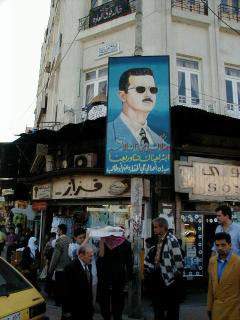Syria is refusing to stop insurgents and foreign fighters from entering Iraq because it is frightened of efforts to build a democratic nation in the heart of the Middle East and wants them to fail, Iraq's foreign minister says.
Hoshyar Zebari said in an interview Thursday with The Associated Press that Syria isn't alone in trying to thwart Iraq's efforts to establish a democracy but because of its proximity, its refusal to cooperate is having a more devastating impact in lost lives from terrorist attacks.
"It is important that the world should know, really, that Syria is not helping. It's not cooperating, despite the many, many pledges, promises - none of that has happened," he said.
With Baghdad expecting insurgents to step up efforts to disrupt the Oct. 15 referendum on a new constitution, Zebari in his speech to the U.N. General Assembly on Wednesday urged Iraq's neighbors, especially Syria, "to root out elements of terror" by tightening border controls.
Syria's U.N. Ambassador Fayssal Mekdad insisted Wednesday that his country has been cooperating with Iraq by deploying 10,000 troops on the border, spending millions of dollars to establish barriers to prevent extremists from crossing, and arresting hundreds of potential infiltrators and sending them home.
He complained that requests to the United States for sophisticated equipment, including night vision binoculars, have been rejected, and he accused Iraq of not doing enough to stop those who make it into the country.
But Zebari said Thursday that the problem rests squarely with Syria.
"The question is not a technical issue ... of border control equipment, technology. It's a question of political will," he said. "We think if you want you can help, and so that's what we are saying. We're not calling for another invasion against Syria by American or international forces."
Asked why he thought Syria lacked the political will, Zebari replied, "I think it's based on wrong assumptions - to make life difficult in Iraq, to see this plan of democracy-building fail in Iraq."
"They and others are frightened, really, of this experiment to succeed. This is the bottom line. They don't want these values, these ideas to take root in a country like Iraq. This may affect them," he said.
"I think this project of democracy-building in Iraq has alarmed many authoritarian autocratic regimes in the region," Zebari said. "Many of them are counting on our failure, and they have not been helpful."
He said his government's response to the Syrians and other opponents is to argue that supporting Baghdad is in their interest, "that a democratic Iraq will not contradict your national interest, your country. We'll do business with you."
He said many Iraqis are defending the country's new democratic goals, which are embedded in the new constitution, including pluralism, democratic freedoms, a bill of rights, separation of powers, transparency and federalism.
"These are new ideas," Zebari said. "That's why they are not comfortable."
In contrast to Syria, he said, neighboring Iran has a very different agenda and is "behaving in a more shrewd way."
The Iranians support their allies and friends in Iraq, "but they are not encouraging or supporting groups to resort to violence, or to take up arms against the multinational force or against the government."
Iran is willing to study information about arms shipments and infiltration and is prepared to follow up on it, he said.
"They don't deny there is infiltration," Zebari said, "but they are always willing to establish mechanisms, communications, etc., to deal with these problems." |
 Hereditary President-for-Life Bashir
Hereditary President-for-Life Bashir 
 Syria received an offer of nuclear weapons six years ago, but is not interested in such arms or in a nuclear reactor, Syrian President Bashar Assad said in an interview published yesterday in the Austrian newspaper Die Presse.
Syria received an offer of nuclear weapons six years ago, but is not interested in such arms or in a nuclear reactor, Syrian President Bashar Assad said in an interview published yesterday in the Austrian newspaper Die Presse. Syrian and Lebanese officials have welcomed the latest report by a UN commission investigating the assassination of former Lebanese prime minister Rafiq Hariri, calling it fair and cooperative. "The report was realistic and has a lot of professionalism,"
Syrian and Lebanese officials have welcomed the latest report by a UN commission investigating the assassination of former Lebanese prime minister Rafiq Hariri, calling it fair and cooperative. "The report was realistic and has a lot of professionalism,"  The UN inquiry into the assassination of
The UN inquiry into the assassination of  Syrian President Bashar Assad plans to attend a UN world summit in New York next month, the first time a Syrian head of state participates in a conference of the world organization, Syria's UN Ambassador
Syrian President Bashar Assad plans to attend a UN world summit in New York next month, the first time a Syrian head of state participates in a conference of the world organization, Syria's UN Ambassador